
A CELEBRATION OF LASTING LEADERSHIP & ENDURING IMPACT

Michael McMahan President & CEO



Michael McMahan President & CEO
Eighty-five years ago, North Texas was considered a medical wilderness, so it’s impossible not to be awed by the profound transformation of Southwestern Medical College on the Old Parkland campus into the internationally renowned UT Southwestern Medical Center, with facilities that stretch across North Texas.
Founder and visionary Dr. Edward H. Cary would be amazed by the state of this world-class Medical Center and the generosity from local business leaders and families that made that growth possible. This issue of Perspectives is a celebration of the partnerships and generational philanthropy that have raised our region’s bar of excellence for health care.
To that end, we celebrate 15 years of impact through the Dedman Family Endowed Program for Scholars in Clinical Care, which was established with a generous gift from the Dedman Foundation. This endowment provides UT Southwestern with the resources needed to recruit promising early-career physicians and contributes first-class mentorship from distinguished faculty and clinical scientists. This esteemed group of 35 scholars has pursued life-changing research in the areas of obstetrics, radiation oncology, dermatology, urology, and more.
Looking ahead, biotech and the life sciences ecosystem will be central to the continued economic growth of our region and key to building a healthier future for our residents. This burgeoning industry has seen tremendous success and growth in the past 10 years, highlighted by the recent designation of Pegasus Park as the Advanced Research Projects Agency for Health (ARPA-H) Customer Experience Hub. ARPA-H will deliver a vast amount of resources to our state and region with a focus on developing accessible and readily adoptable health solutions. For more insights from local leadership on what role your support can play in the future of North Texas, check out the Looking Forward to 100 sections throughout the magazine.
We are also delighted to be a partner with Children’s Health and UT Southwestern to improve health outcomes for the youngest members of our community with the construction of a state-of-the-art pediatric campus in the heart of Dallas’ Southwest Medical District. The new pediatric campus will meet a surging demand for care, research, and training in North Texas and is a true symbol of the collaborative nature of our community.
We recognize none of the incredible milestones we’ve experienced would be possible without the support of those around us. We embrace a time of leadership transition within our own ranks with gratitude for Kay Schlankey’s service as Senior Vice President and CFO and a warm welcome to Sarah Fletcher in her new role as CFO.
As we commemorate the accomplishments of the last 85 years, we urge you to join us in our continued pursuit of medical excellence for another 85.
EDITORIAL DIRECTOR

Carsen Young, LDWW
EDITORIAL TEAM
Emily Davis
Blake Evans
Sarah Fletcher
Trae Holmes
Brittany Lebling
Dustin Magwire
Michael McMahan
Paget Paul
Stephanie Vidikan
WRITERS
Laura Kostelny
Sharon Reynolds
DESIGN DIRECTOR
Ken Maxwell, LDWW
PHOTOGRAPHERS
Steve Foxall
Casey Holder
Grant Miller
Mike Morgan
Ren Morrison
Brad Newton
Brandon Wade
Craig Washburn (cover)
Editorial comments and contributions are welcome.
Send correspondence to:
Southwestern Medical Foundation
Parkland Hall at Old Parkland
3889 Maple Avenue, Suite 100 Dallas, Texas 75219
info @ swmedical.org 214-351-6143
8-13; 18-23; 36-41
Profiles In Generosity
Three families have spent decades funding a number of medical breakthroughs, state-of-the-art facilities, and community health improvements.

26
Biotech Rush
North Texas—and specifically, Pegasus Park—has become the place for big thinkers to come together to create innovative health solutions.
Much like the city of Dallas, the story of Southwestern Medical Foundation is about ambitious growth and progress.

Children First
A sprawling new pediatric health campus will ensure that North Texas has the best medical treatment available.

30
The Cary Council
A new generation of leadership takes on funding early-stage research at UT Southwestern.

24
The Ultimate Gift
The Dedman Family Endowed Program for Scholars in Clinical Care celebrates 15 years of unlocking the potential of UT Southwestern’s rising stars.

42

The Sprague Award
Southwestern Medical Foundation honors Bonnie Bass
Smith, Barbara Bass Moroney, Jim Bass, and the Rita Crocker Clements Foundation for their generous donations of time, leadership, and resources, which have resulted in dramatic health care advances and benefits.

60
Meet Sarah Fletcher
Southwestern Medical Foundation’s new CFO answers eight of our most pressing questions.
11-13; 17; 21-23; 30-41; 43
Looking Forward to 100
A host of community leaders share their thoughts on how medical breakthroughs and innovations in health care will impact North Texas in the next 15 years.
President’s Letter
New Trustees & Annual Meeting

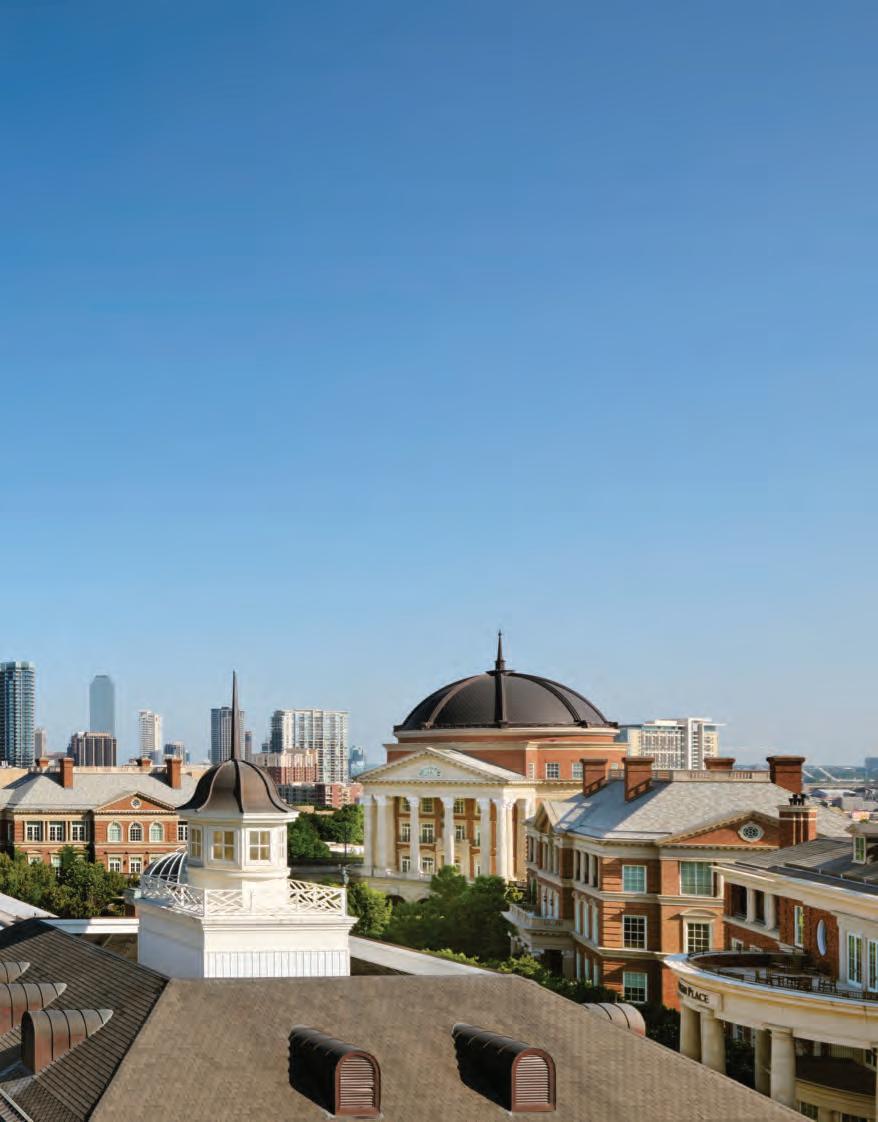
Much like the city of Dallas, the story of Southwestern Medical Foundation is about ambitious growth and progress. Established by Edward H. Cary, M.D., in 1939 with support from noted philanthropist Karl Hoblitzelle and a number of Dallas’ major civic leaders, the Foundation’s partnership with community made possible the establishment of one of the world’s leading destinations for medical treatment and academic medical training.

When Baylor College of Medicine moved from Dallas to Houston in 1943, Southwestern Medical Foundation Trustees became even more determined that their city would continue to have a medical school and formed Southwestern Medical College. Classes and laboratories were located in temporary army barracks behind the old Parkland Hospital, which served as the Medical College’s facility for clinical teaching. There were 17 full-time faculty members and 200 students on campus that first year in academic space totaling 50,000 square feet, and an annual operating budget of less than $300,000.
In 1946, Hoblitzelle donated 62 acres of land adjacent to the proposed site of the new Parkland Hospital to provide a campus for the forthcoming school. “The Medical School, at the outset of the 1950s, had almost no financial resources whatsoever, and the facilities were poor. It was an opportunity as well as a problem. Fortunately, we had resources of a kind which should be remembered: we had students; we had housestaff; and we had student fellows. They would be, ultimately, the faculty of the future,” said the late Donald W. Seldin, M.D., the “intellectual father” of UT Southwestern. In the mid-1950s, the school and medical center moved off the old Parkland campus.

In the years that followed, many of the same families who have worked tirelessly to make Dallas a world-class city when it comes to the arts, attracting big business, and winning World Series and Super Bowls, have also made it a priority to ensure that our local medical community, which includes UT Southwestern, Children’s Health Dallas, and Parkland Memorial Hospital, remains one of the leading hubs for medical research, academic medicine, and clinical care in the world.
Local business leaders and philanthropists recognize the importance of investing in leading-edge health advancements to better care for our local population and the world at large. Today, the UT Southwestern campus includes more than 1 million square feet of state-of-the-art research space and 20 endowed centers. Faculty and residents provide care to more than 120,000 hospitalized patients, 360,000 emergency room cases, and nearly 5 million outpatient cases annually. Additionally, the institution’s faculty has received six Nobel Prizes and includes 25 members of the National Academy of Sciences, 24 members of the National Academy of Medicine, and 14 Howard Hughes Medical Institute Investigators.
Originally established as a teaching hospital in 1913, Old Parkland has experienced a varied history through the years, including periods as a psychiatric hospital and rehabilitation facility. However, by the early 2000s, the property had fallen into disrepair. Enter Harlan Crow of Crow Holdings, who announced in 2006 that he would buy Old Parkland from Dallas County and renovate it for use as the new company headquarters. Today, Old Parkland is home to beautifully restored, classically designed buildings, lush landscaping, fine art and rare artifacts, and two Texas Historical Markers noting the significance of Parkland Hospital and Southwestern Medical Foundation’s founding of Southwestern Medical College. In 2010, the Foundation relocated its offices to the Old Parkland campus, and in 2015, moved into Parkland Hall, which is built on top of the exact location of Southwestern Medical College’s original footprint. All these years later, the campus continues to be a place that celebrates history, represents American ideals, and showcases what’s possible when a community comes together.





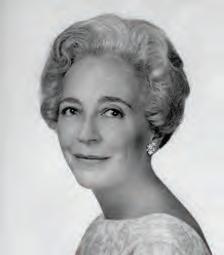


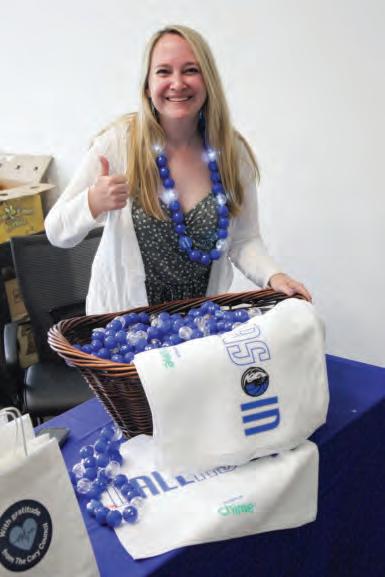








Five decades of medical breakthroughs have been made possible thanks to the family’s ongoing generosity.

It is difficult to overstate the influence the McDermott family has had on Southwestern Medical Foundation and UT Southwestern Medical Center during the last five decades. Their generosity can be felt in virtually every aspect of the institution, from its welcoming landscape and lobby artwork to the highest and most exacting levels of research and education. Many of the Medical Center’s most inspired projects were made possible through the McDermotts’ staunch dedication to the UT Southwestern community.
A scientist, businessman, and philanthropist, Eugene McDermott began the enduring legacy of giving back to our community as early as 1950, when he co-founded the St. Mark’s School of Texas. With J. Erik Jonsson and Cecil Green, he also co-founded the company that became known as Texas Instruments. Eugene helped advance higher education through significant gifts to Southern Methodist University, Massachusetts Institute of Technology, and UT Southwestern Medical Center. In 1961, he co-founded the Graduate Research Center of the Southwest, known today as The University of Texas at Dallas.
Eugene and his wife, Margaret, demonstrated an unwavering support for UT Southwestern through numerous gifts that included establishing the Eugene McDermott Academic Administration Building and Plaza, the Eugene McDermott Center for Human Growth and Development, the Eugene McDermott Center for Pain Management, the Eugene McDermott Distinguished Chair for the Study of Human Growth and Development, the Eugene McDermott Scholar in Medical Research, and several other contributions that have shaped the course of UT Southwestern’s expansion and development.

Following Eugene’s passing in 1973, Margaret continued her husband’s legacy for the remainder of her life. Her affinity for art influenced her philanthropic endeavors, which included the Dallas Public Library, the Dallas Museum of Art, and the Dallas Symphony Orchestra. Her appreciation for beautiful expressions can still be witnessed today at the Zale Lipshy PavilionWilliam P. Clements Jr. University Hospital, where the vibrant colors and patterns of the 300 traditional Asian textiles she donated now line the hallways. The unique merging of health and art was a result of her leadership in 1986, when she suggested a partnership with the Dallas Museum of Art to help humanize the hospital’s interior. Margaret also gave a $4.5 million gift with the Eugene McDermott Foundation to the UT Southwestern William P. Clements Jr. University Hospital to ensure it had the “very best” landscaping.


community is shared by their daughter, Mary McDermott Cook. After her mother’s passing in 2018, Mary continued her family’s legacy of giving, and in her own right, plays a much-admired role in Dallas philanthropy and civic leadership. As president of the family’s Eugene McDermott Foundation, she continues her parents’ philanthropic impact, carrying out their civic legacy through projects that improve the Dallas community.
Mary joined the Southwestern Medical Foundation Board of Trustees in 1988 and became an Honorary Trustee in 2020. Her extensive contributions included roles on the Executive and

Since its founding in 1841 on an endless prairie of grass, Dallas has competed with its neighbors to attract the best people, industry, and business. Railroads, highways, and airports made it a transportation center. Cotton, banking, oil and gas, retailing, and technology became its economic core. But the critical advantage of any community is its people.
Families and talent are attracted to cities that are well run; have great schools, lively arts, and entertainment; and most of all, have outstanding medical resources.
Doctors and researchers are attracted to Dallas not only because of its stateof-the-art facilities and its generous community, but because they can flourish while working alongside medical and scientific leaders from around the world. UT Southwestern has attained a critical mass for future growth that will only be accelerated by medical advancements.
The community attracts top medical talent, which in turn attracts a young, vibrant community.
The economic growth opportunities for North Texas are just beginning.
Jere W. Thompson, Jr. Chair, Southwestern Medical Foundation

Over the past several years, we have assembled the pieces to catalyze the North Texas biotech ecosystem, including intellectual capital from institutions like UT Southwestern, infrastructure for companies like BioLabs to optimize laboratory operations, and a growing talent pipeline. The next piece is further growth of available capital, in both philanthropic and venture capital funding, to support the constant innovation happening in our community. Now that the ecosystem has been established, I anticipate an even stronger biotech deal pipeline; further development to infrastructure in place; ultimately, more jobs available benefitting our state’s economy; and most importantly, better health outcomes for our world, starting here in North Texas.
Public Affairs Committees, as well as chairing the Scholarship Committee. She also served on UT Southwestern’s President’s Advisory Board.
“My father had great respect—as do I—for the fine minds at work throughout the Medical Center, so he took great pleasure in the friendships he formed there and was proud to be a part of its growth. He was an incredibly smart man, so he did very well for our family. Giving back was part of his life, and he encouraged me to make it part of mine.”
—MARY MCDERMOTT COOK



The McDermott family’s mission shows no signs of stopping. Mary’s daughter Grace continues to make it her business to give back. As a Founding Member of The Cary Council, she provided leadership on the Steering Committee and also served as co-chair of the 2021 An Evening With DocStars event. Through her efforts in membership recruitment, social media and communications, and volunteerism, Grace has helped lead The Cary Council’s efforts to support early-career investigators who are driving breakthroughs in medicine at UT Southwestern.
Gift to support construction of the Texas Instruments Biomedical Engineering and Sciences Building (BMES)
Gifts through the Eugene McDermott Foundation to The Cary Council Fund, including presenting sponsor of An Evening with DocStars in 2021 and personal financial underwriting gifts
Mary McDermott Cook honored with The Sprague Award in 2011
Gift to support Alfred G. Gilman Distinguished Chair in Pharmacology
Gift for landscaping by Peter Walker to enhance William P. Clements Jr. University Hospital
Gifts to support construction of Clements University Hospital, in honor of Drs. Al Roberts and Charles Pak
Establishment of Kern and Marnie Wildenthal Family Fund for Enhancement of the Arts at UT Southwestern and UT Dallas
Gift to help endow George N. Peters, M.D., Center for Breast Surgery
Establishment of S.T. “Buddy” Harris
Distinguished Chair in Cardiac Anesthesiology; gift to support compiling and writing of “Anesthesiology at Southwestern, The First Fifty Years”
Mrs. Eugene McDermott honored with The Sprague Award in 1993
Gift to support construction of Bryan Williams, M.D. Student Center
Collaborative gift to create the Endowed Scholars Program in Medical Science Campus beautification
UT System Board of Regents established Mary McDermott Cook Chair in Pediatric Genetics
Excellence in Education Foundation established Eugene McDermott Distinguished Chair in Molecular Genetics
Establishment of Eugene McDermott Center for Pain Management
Establishment of Philip O’Bryan Montgomery Jr., M.D., Distinguished Chair in Developmental Biology
Gift to support Donald W. Seldin Distinguished Chair in Internal Medicine
Gift to help establish Robert V. Walker, D.D.S. Chair in Maxillofacial Surgery
Gift to support the Berta M. and Cecil O. Patterson Endowment Fund for Research in Digestive Diseases
Gift to support Charles Cameron Sprague, M.D. Chair in Medical Science
Gift to support the Robert L. Moore, M.D. Chair in Pediatrics
Various gifts to support Zale Lipshy initiatives, including textile collection
Gift to bring nuclear magnetic resonance imaging to UT Southwestern
Establishment of Eugene McDermott Scholarship Fund
Various gifts to support brain research
Gift of David Novros fresco on South Campus
Gift to endow the M.T. “Pepper” Jenkins Professorship of Anesthesiology
Gift to support Dr. Eugene P. Frenkel Research Fund
Establishment of Dr. Bryan Williams Student-Faculty Fund for student scholarships and special activities
Establishment of Eugene McDermott Center for Human Growth and Development
Gift to support construction of the Eugene McDermott Basic Science Research and Administration buildings, Eugene McDermott Plaza and furnishings on South Campus
Gifts to support the Family Planning Care and Maternal Health Program
Establishment of Margaret Milam McDermott Chair in Anesthesiology
(upgraded to a Distinguished Chair in 1993)
Establishment of Eugene McDermott Chair for the Study of Human Growth and Development (upgraded to a Distinguished Chair in 1975)

Investments in medical research, clinical care, health care infrastructure and facilities are critical cornerstones for the future success of our community. North Texas’ growing adult and pediatric populations will require access to highly rated health care facilities and providers to thrive and grow. Funding research and clinical care creates a beneficial ‘flywheel’ through which North Texas can attract top medical professionals and researchers, therefore continuing to grow our capacity to care for our growing community.


TO MEET THE DEMANDS THAT COME WITH RAPID GROWTH, A SPRAWLING NEW DALLAS PEDIATRIC CAMPUS WILL ENSURE THAT THE YOUTH OF NORTH TEXAS AND BEYOND HAVE ACCESS TO EXEMPLARY CARE.

CHILDREN’S HEALTHSM AND UT SOUTHWESTERN MEDICAL CENTER HAVE UNVEILED PLANS FOR A NEW $5 BILLION PEDIATRIC HEALTH CAMPUS IN DALLAS’ SOUTHWESTERN MEDICAL DISTRICT. THE NEW CAMPUS WILL SPAN MORE THAN 33 ACRES AND OFFER A PATIENT-CENTRIC DESIGN THAT CAN MEET THE RAPIDLY INCREASING NEED FOR MORE PEDIATRIC SERVICES RANGING FROM THE MOST COMMON TO THE MOST COMPLEX. IT WILL SERVE AS A JOINT HUB FOR INNOVATION, ACADEMIC RESEARCH AND TRAINING, AND THE DEVELOPMENT OF LIFESAVING TECHNOLOGIES THAT WILL PROVIDE EXEMPLARY CARE FOR THE YOUNGEST MEMBERS OF OUR COMMUNITY.
The approximately two million-square-foot hospital will have two 12-story towers and one eight-story tower that will replace the existing Children’s Medical Center Dallas. It will significantly expand inpatient, surgical, and outpatient capacity to meet the needs of one of the fastest-growing and largest metropolitan areas in the country. The pediatric campus, expected to open in the next six to seven years, will be built on the UT Southwestern campus on the corner of Harry Hines Boulevard and Mockingbird Lane, across from UT Southwestern’s William P. Clements Jr. University Hospital. Designed to optimize the well-being of patients and their families, the spaces will offer a unique environment that supports compassionate and personalized patient and family experiences, aiming to reduce stress and foster health and healing.


• 4.7 million square feet of construction
• 552 beds (a 38% increase from the current Children’s campus) with space for future expansion
• Expanded Emergency Department space (15%) and operating rooms (22%)
• Two helicopter pads
• A Level I Pediatric Trauma Center with 90 ER exam rooms and 24 observation rooms
• A connector bridge between the new campus and Clements University Hospital to ensure continuity of care for babies, with direct access to the pediatric expertise provided at the Children’s Health Level IV Neonatal Intensive Care Unit (NICU) and Cardiovascular Intensive Care Unit (CVICU)
• A new fetal care center provides the region’s most advanced and accessible services for complex maternal and fetal health care, including fetal surgery capabilities at the adjoining Clements University Hospital
• A new outpatient clinic building that will add 96 exam rooms to the 344 that will continue to operate at the existing Children’s Health Specialty Center Dallas outpatient facility on Stemmons Freeway at Medical District Drive
“Our comprehensive and team-based care approach is unique in the region, highlighted by specialists in every pediatric field who collaborate to provide compassionate, high-quality care for children,” said Maeve Sheehan, M.D., Chief Medical Officer at Children’s Medical Center Dallas and Professor of Pediatrics and Vice Chair for Clinical Operations at UT Southwestern. “This type of care model has been front and center in our design process, guiding the creation of spaces that not only accommodate medical excellence but also prioritize the comfort, healing, and individual needs of each child.”
The new pediatric campus will draw upon the extensive academic resources and collaborative, leading-edge research underway at UT Southwestern. The innovative design of facilities—located next door to UT Southwestern’s globally ranked research hub—will help recruit leading pediatric clinicians, established and emerging researchers, residents, fellows, medical students, and the most talented individuals in nursing, medical technology, and related health professions.
“The pediatric campus is the next chapter in our more than 60-year partnership with Children’s Health and will elevate clinical innovation and transformative science that will benefit pediatric patients and their families for generations to come,” said Daniel K. Podolsky, M.D., President of UT Southwestern Medical Center. “The expertise on our campus, supported by state-of-the-art technologies and facilities, will enhance our commitment to excellence and compassion in providing the very best care for children and position us to accelerate the future of pediatric medicine together.”

Physical and mental health are intangible, invaluable assets that contribute to a higher quality of life and well-being. Our region’s health and economic viability is enhanced by the presence and strength of UT Southwestern Medical Center. For 85 years, Southwestern Medical Foundation has been a philanthropic partner to the world-class Medical Center that sets the bar for excellence in innovation, education, and patient care. The legacy of our investments today to build a better, healthier world will be a promising and brighter future for all.
Alfreda B. Norman Trustee, Southwestern Medical Foundation












For more than three decades, the Dedmans have championed UT Southwestern’s clinical and scientific faculty and expanded its reach throughout the world.

Every member of the Dedman family is committed to their roles as leaders and change-makers in the community. Nancy and the late Robert Dedman Sr. taught each of their loved ones to “be a giver, not a taker.” To a Dedman, there is nothing greater than the “joy of giving while living and seeing one’s gift in action.”
They live by the credo that “Integrity, good health, family, and friends are worth more than anything money can buy.”
To that end, the Dedman family has made it their mission to build on Southwestern Medical Foundation’s successes, and they continue to plant the seeds of giving with each new generation. They have created a remarkable legacy of caring through their shared vision that has enriched the lives of so many people in North Texas and beyond.
Robert H. Dedman Jr. has been a dedicated Trustee of Southwestern Medical Foundation since 2000, serving on several key committees, including the Personnel Committee. He currently serves on the Executive Committee and the Investment Committee, where he previously held a leadership position as Chair. He also serves on UT Southwestern’s President’s Advisory Board.
In 2008, the family established the Dedman Family Endowed Program for Scholars in Clinical Care to support translational research that speeds discoveries and gives greater opportunities to researchers and clinicians to advance medical science. This program aids in recruiting the most promising early-career physicians to the Medical Center and launches their careers under the mentorship of senior clinicians and clinical scientists.

For investigators, it is a distinct honor to become a Dedman Scholar. Candidates are chosen because of their ability to see the world through a different lens. Where others see challenges, Dedman Scholars see infinite possibilities. Traditional funding sources do not readily support the initiation of high-risk, challenging research, and this financial contribution has filled a void for researchers whose work could open doors to significant discoveries.
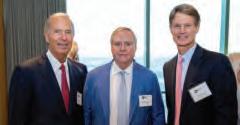

The Dedman Family Endowed Program for Scholars in Clinical Care has funded 35 Dedman Scholars and their innovative research, which spans fields such as cardiovascular disease, type 1 diabetes, organ transplantation, cystic fibrosis, cancer, liver disease, and more. The work of the Dedman Scholars has led to greater understanding of science, paved the way toward additional grant funding sources, led to new patents and drugs, spurred new ideas for research, and resulted in numerous scientific papers featured in medical publications.

Investing in medical advancements and research will enable our community to grow as a world-class city that attracts not only significant new business investments in our economy but improves the quality of life for all of our citizens. Increased employment and future prosperity is always the result for those communities with the vision to invest in medical research, thus Dallas will be well-positioned for many years to come.
James R. Huffines

Investing in medical advancements today can improve health care outcomes, catalyze economic growth, foster innovation, and enhance overall quality of life in North Texas. These benefits are interconnected, creating a positive cycle of growth and prosperity. UT Southwestern would not be the regional asset it is today without the investments of the past, and we have a duty to continue this critical funding into the future.
Katie H. Robbins

Jonathan Dietz, son of Patricia Dedman Nail, and his wife, Saryn, stepped up as members of The Cary Council to help engage and educate an emerging generation of rising community leaders in the Greater Dallas area. They have helped grow this vibrant group of young philanthropists who are dedicated to advancing early-stage research at UT Southwestern, in partnership with Southwestern Medical Foundation. In 2023, Saryn and Jonathan were chairs of The Cary Council’s An Evening with DocStars, an annual fundraiser and celebration of innovation in earlystage research.
The family made a significant investment in the academic leadership of UT Southwestern in 2017 by establishing the Dedman Family Distinguished Chair in Neurological Disease. This permanently endowed Chair is held by a distinguished faculty member in neurology and supports his or her research and academic pursuits.

Highly sought after by leading physicians and scientists, endowed academic positions enable UT Southwestern to recruit and retain exceptional faculty leaders who in turn advance the institution’s service and standing as one of the world’s leading academic medical centers. Endowed academic positions honor the achievements and ensure the legacy of distinguished faculty members in perpetuity.
The Dedmans also provided a generous gift to support the creation of the William P. Clements Jr. University Hospital, which opened in December 2014. Clements University Hospital has become a model of excellence for hospitals across the country and has fully integrated UT Southwestern’s research, clinical, and educational missions—elements that make an academic medical center unique among health care providers.
In 2020, UT Southwestern completed an expansion of the hospital, where a 12-story third tower serves as the clinical home for the Peter O’Donnell Jr. Brain Institute. Clements University Hospital has expanded to more than 750 rooms, along with its capacity for emergency, cancer, and neurological care. The hospital’s emergency department grew by more than 50 percent, enabling UT Southwestern to better care for the community.
2021
Additional gift to the Dedman Family Endowed Program for Scholars in Clinical Care, which added a scholar in a clinical specialty area relevant to the O’Donnell Brain Institute
Gifts through the Patricia Dedman Family Foundation to The Cary Council Fund and An Evening with DocStars sponsorships that support early-stage research
2017
Established the Dedman Family Distinguished Chair in Neurological Disease to benefit a Department of Neurology faculty member
2014
Gift to support construction of William P. Clements Jr. University Hospital 2009
The Dedman family is honored with The Sprague Award 2008
Established the Dedman Family Endowed Program for Scholars in Clinical Care
2000
Robert Sr. and Nancy joined the President’s Research Council 1994
Robert Sr. and Nancy joined the Friends of Zale-Lipshy University Hospital
1986
Robert Sr. and Nancy joined the Friends of the Center for Human Nutrition

Investing in medical advances today enables Dallas to capitalize on its research-rich health care environment. This benefits science, the health of our community and society. It also helps to strengthen North Texas’ reputation as a center for health care innovation, which will attract additional participants to the ecosystem.
Kelvin A. Baggett, M.D. Trustee, Southwestern Medical Foundation



The Dedman Family Endowed Program for Scholars in Clinical Care celebrates 15 years of unlocking potential for UT Southwestern’s rising star clinicians. To date, 35 scholars have received invaluable support across 12 medical disciplines.
“I am honored to be a Dedman Scholar. The generosity of the Dedman family has afforded me the opportunity to develop and pursue my passions in a way that I would not have been able to do so otherwise. The Dedman Family Endowed Program for Clinical Scholars has helped shape me into the clinician and researcher that I am today by supporting the development and execution of research proposals, procurement of research grants from both national and foundation sources, and development of partnerships with community organizations to impact the health of those beyond the health system.”
– MICHAEL E. BOWEN, M.D., M.P.H., M.S.C.S.
“The Dedman Scholar award provides substantial foundational support in my pursuit of understanding biliary atresia better –both in the operating room and at the research bench. In surgery, I have the privilege and opportunity to help individual children, but my translational research has the potential to help children beyond the DFW region. My hope as a surgeon scientist at UTSW and Children’s Medical Center is that understanding how and why this disease occurs will translate into better care and improved overall survival of all children with biliary atresia.”
– NATASHA CORBITT, M.D., Ph.D.
“It is an honor to be named a Dedman Scholar among many other distinguished scholars. The Dedman award has brought attention to the unique needs of young adults with mental health disorders, a population that is often overlooked. As a Dedman Scholar, I’ve been able to build the foundation to develop a comprehensive Transitional Age Youth program. I’m creating research initiatives to better inform patient care, adding case management services to enhance the educational/vocational success of these patients, and enhancing therapy services. I’ve been able to develop interinstitutional collaborations across hospital systems to ensure patients remain in psychiatric care as they transition from pediatric to adult care. As a Dedman Scholar, I will be able to make meaningful change for an at-risk population of patients.”
– JESSICA MOORE, M.D.
“As a Dedman Scholar, I am confident that the infrastructure and wealth of resources at UTSW will provide me a unique and rich opportunity to succeed in my academic and clinical goals. Our high clinical volume in prostate cancer, lack of focal treatment options offered in the community, and strong patient interest demonstrate the critical need for a comprehensive prostate cancer focal therapy program. Support from the Dedman Scholars program will be critical in helping me develop the infrastructure required to expand our focal therapy program and generate the correlative preliminary data that will enable me to successfully compete for federal and CPRIT funding and create a center of regional and national recognition.”
– XIAOSONG MENG, M.D., Ph.D.


Margaret Katie Hoge, M.D. Pediatrics
Daniel X. Yang, M.D. Radiation Oncology
Rina Mauricio, M.D. Internal Medicine
Madhukar Patel M.D., M.B.A., Sc.M. Surgery

Jessica Grubman, M.D., M.A.S. Obstetrics and Gynecology
Xiaosong Meng, M.D., Ph.D. Urology
Natasha Corbitt, M.D., Ph.D.
Division of Pediatric Surgery
Jessica Moore, M.D. Psychiatry
Kimberly Goodspeed, M.D.* Pediatrics, Neurology, and Psychiatry
Ana Tavakkoli, M.D., MSc Internal Medicine, Division of Digestive and Liver Diseases
Nina Niu Sanford, M.D. Radiation Oncology
Ksenya Shliakhtsitsava, M.D., M.A.S. Pediatrics, Pediatric Hematology Oncology
Maria Florian-Rodriguez, M.D., FACOG Obstetrics and Gynecology, Division of Female Pelvic Medicine & Reconstructive Surgery
Jacob B. Hunter, M.D.** Otolaryngology-Head and Neck Surgery
Alexandra K. Callan, M.D. Orthopaedic Surgery, Division of Musculoskeletal Oncology
Pearlie Pao Ee Chong, M.D., MSCR, FIDSA Internal Medicine
Aditya Bagrodia, M.D.* Urology, Oncology
Neil B. Desai, M.D., M.H.S. Radiation Oncology, Division of Clincial Radiation Oncology
Ian J. Neeland, M.D.* Internal Medicine, Division of Cardiology
Sarah Oltmann, M.D., FACS Surgery
Muhammad Shaalan Beg, M.D.* Internal Medicine, Division of Hematology and Oncology
David B. Nelson, M.D. Obstetrics and Gynecology, Division of Maternal Fetal Medicine
Matthew R. Porembka, M.D. Surgery, Division of Surgical Oncology
Michael E. Bowen, M.D., M.P. H., M.S.C.S. Internal Medicine and Pediatrics
Donald A. Glass II, M.D., Ph.D. Dermatology
Peter Noel Van Buren, M.D., M.S.C.S. Internal Medicine
Olga T. Gupta, M.D.* Pediatrics and Internal Medicine, Division of Endocrinology
Tanya C. Watt, M.D., MSc Pediatrics
Gaurav Arora, M.D.* Internal Medicine
Raksha Jain, M.D., M.S.C.I Internal Medicine, Division of Pulmonary and Critical Care Medicine
Amit G. Singal, M.D., MS Internal Medicine, Division of Digestive and Liver Diseases
Jarett D. Berry, M.D.* Internal Medicine, Cardiology
J. Andrew Bird, M.D. Pediatrics, Division of Food Allergy and Immunology
Laura Klesse, M.D., Ph.D. Pediatrics, Division of Hematology and Oncology
Binh-Minh (Jade) Le, M.D.* Internal Medicine




North Texas—and more specifically, Pegasus Park—has become the place for innovative thinkers to gather and bring into reality health solutions that promise to impact the world in a significant way.

Last spring, Southwestern Medical Foundation launched “Learning From Leaders,” a monthly podcast that provides a platform for knowledge exchange, mentorship, and collaborative problem-solving. Hosted by Lili Clark, a member of The Cary Council, each episode fosters a unique learning experience packed with valuable insights, practical advice, and inspiring stories from seasoned community leaders. On a recent episode, Clark was joined by Nicole Small, CEO of Lyda Hill Philanthropies and LH Capital, and Matt Crommett, managing director at Lyda Hill Philanthropies, who oversees a portfolio of nature and science investments in grants. The trio discussed Pegasus Park, the 26-acre campus that has become a hotbed of biotech innovation and social impact. Read all about it below and learn even more by checking out the podcast, which is available on Apple, Spotify, and wherever you get podcasts.
*This interview has been edited and condensed for clarity.
Lili Clark: Describe Pegasus Park and its mission.
Nicole Small: Pegasus Park is a campus located near Dallas’ Central Business District and UT Southwestern that is dedicated to all things biotech, life sciences, and social innovation. Our main tower building houses the offices of more than 30 nonprofits, as well as UT Southwestern, a gene therapy company, and several other exciting businesses. Our shared wet lab facility, BioLabs, is located across campus and is where we host gatherings with startup life sciences companies.
LC: What is the history of the Pegasus Park campus?
NS: The building was originally built in 1970 by the Zale family as headquarters for Zale Corporation. It was featured in a movie in the 1970s, and there are all sorts of fun stories about diamond elevators. In 1981, it was sold to ExxonMobil, which vacated the campus in 2015. We embraced the opportunity to bring this iconic Dallas landmark back to life by redeveloping it into Pegasus Park.
Innovation districts like Pegasus Park must be located adjacent to important academic institutions, so we anchored our social innovation work in the nonprofit sector near UT Southwestern, one of the nation’s leading academic medical institutions. UT Southwestern is a leader in basic science research that is necessary to accelerate the pace of discovery and help move medical advancements from bench to bedside. Six UT Southwestern faculty have received Nobel Prizes, and their work and the work of other scientific leaders has enhanced health care and changed lives for countless people around the world.
Bringing great minds together in one place is inspiring. Pegasus Park is a meeting of the minds—all things innovation—whether you are a board member, a venture capitalist, a startup founder, or a nonprofit leader.
LC: Pegasus Park is a great example of a project that combines for-profit and nonprofit capital. Could you describe it and how it plays out in practice?
Matt Crommett: There is so much for-profit and nonprofit activity happening on campus, and it is illustrated by the tenants in this 18-story tower. One of the floors houses Health Wildcatters, an investment group that also runs an accelerator for health tech companies. We have investors who are seeking for-profit opportunities, and they come here to work together on health solutions. Our nonprofits on campus span different areas and fields, and each day they spend time together and “collide for impact.”
LC: Can you describe the “Water Cooler”?
NS: When we first envisioned Pegasus Park, we wanted to empower nonprofits to excel in their work. We have an outstanding group of nonprofits in our community with exceptional leaders who are experts in their space and are making great impact on our community.
In the nonprofit space, we tend to invest differently than in the for-profit space. We ask nonprofits to solve the world’s most difficult problems, but they are challenged on how to allocate capital. We ask many questions and constrain the capital. Donors will usually give a restricted gift, and many times nonprofits are not allowed to use that capital for people, space, or place because it must be used for the most innovative ideas. Then you must write a 150-page report.
It is not that nonprofits shouldn’t be held accountable and metrics-driven, but we found that many nonprofits we knew were really constrained by the basic things that a startup in the venture world would not be. In the venture world, you pay the best people and have access to the best technology.
We wanted to help supercharge any of the nonprofits that we worked with and create space to allow them to focus more on their mission and less on the things that don’t matter as much. We try to attract the best talent to occupy our space because we need the brightest minds to solve pressing issues like poverty and health equity. We believe if we create a place where people want to come to work, it would help
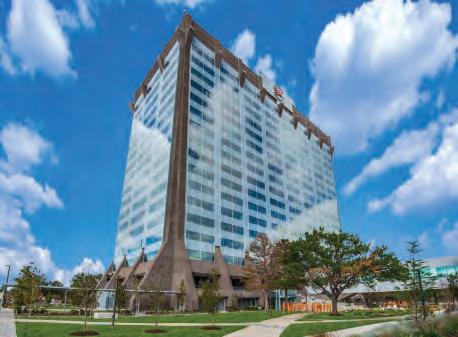
attract human capital. By putting people in the same space, we wondered if work would get done faster, more efficiently, better, and differently.
Thus, the “Water Cooler” idea was born. It is a shared collaborative space aimed at helping organizations attract and retain talent and improve their collaboration. More than 30 nonprofits are housed on five floors in almost 200,000 square feet. Some spaces are small, and partner organizations might share space. Uplift Education takes up an entire floor. Several family foundations have moved into the building because they realized they could be close to the work and the people they are supporting, which creates a different dynamic than when funders and grantees are located in separate places.
Pegasus Park has been an exciting project. We are witnessing collaboration and trust between grantors and grantees and between many nonprofits that are working together for the first time. Each day, you can ride the elevator with someone and learn so much about them. If you need to work together, you work together faster and think more effectively.

LC: The collaboration piece rings true to the biotech side of the campus as well. Could you talk about various biotech groups on campus and what it means for them to be co-located in this way?
MC: There are few places in Dallas and around the country where you will find public and private academic institutions of higher education come together on a thirdparty campus like Pegasus Park.
UT Southwestern takes up five floors in the tower, including its Office of Technology Development, which helps bridge the forprofit and nonprofit emphasis on campus. It has been a signal to other universities to consider doing something similar.
Many conversations are happening across campus through collaborations between public universities that are part of the University of Texas System. The entrepreneurship group at UT Dallas works closely with UT Southwestern in a dual program that often meets at Pegasus Park. They identify biomedical engineering startups that share principal investigators across their campuses to form companies that advance health. UT Arlington is a huge resource for our region that sponsors a company each year to be part of BioLabs.
Southern Methodist University’s Institute for Computational Biosciences is a new presence on campus, just about to open, and we are excited to have them here to collaborate with their neighbors. Dallas College recently won a grant of almost $9 million from the U.S. Economic Development Administration, a federal program that helps regions around the country make better jobs accessible to underskilled workforces. The EDA supports Dallas College, Collin College, and Tarrant County College through a partnership with industry to provide better biotech, bioinformatics, and biomanufacturing jobs that will pay more than $15 an hour in regions that previously did not have training programs.
LC: Describe what is happening in the region more broadly. NS: They always say, without your health, you basically have nothing, right? In Texas, and particularly in North Texas, we have one of the most diverse growing populations in the country. We must address health equity and make sure we are bringing the best technologies to market. We are sitting at the precipice of a major decade of discovery, and there will be much innovation happening in the clinical trials and the artificial intelligence spaces. Given that we have UT Dallas, UT Southwestern, Texas Instruments, AT&T, McKesson, and all these amazing companies here, we are right on the edge of innovation in life sciences in North Texas.

“Education was very important for my family,” Nicole Small told the Dallas Morning News back in 2012 when she was CEO of the Perot Museum of Nature and Science. “I grew up in a house where discovery in early childhood was a core discussion,” she said. Raised in Dallas by her father, Dr. Charles Ginsburg, and her late mother, Judy Ginsburg, the topic of service was also often a focus. Her mother was a full-time volunteer, and Ginsburg recently retired after more than 50 years at UT Southwestern in roles including chairman of UT Southwestern’s Department of Pediatrics, the first medical director at Children’s Medical Center Dallas, and vice provost and senior associate dean of education at UT Southwestern.
Those talks made quite an impact. Small ended up devoting her life to discovery and service, spearheading efforts to raise more than $185 million to create the Perot Museum; cofounding the IF/ THEN Initiative, which seeks to further advance women in STEM by empowering current innovators and inspiring the next generation of pioneers; and consulting internationally before taking on her role as CEO at LH Capital. “We have generally stayed the course on being focused on investing in all things science,” she says. “Last year we gave more than 500 grants and are well on the way to giving away a significant amount of capital to really make the world a better place.”
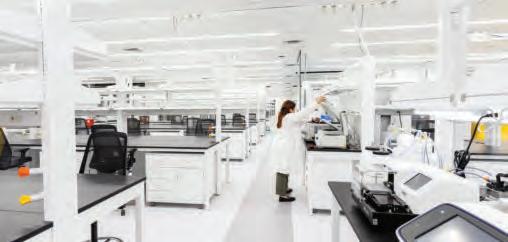
LC: We have had many exciting updates in our ecosystem over the past few years. If you had to name the biggest success story, what would it be?
NS: The obvious success story is the designation of Pegasus Park as the Advanced Research Projects Agency for Health (ARPA-H) Customer Experience Hub. The U.S. government launched this federal agency for health a few years ago and made it available across the country, where dozens of cities competed for one of two outposts outside the Washington, D.C. area. Here in Texas, we have a diverse population of people in need of health care improvement so we partnered with great institutions across the state to showcase our innovative science to the government and the world.
We were excited to collaborate with others to bring ARPA-H’s headquarters to Pegasus Park. They will fund the most innovative, creative, cutting edge technologies that will rapidly translate into health improvements. We have already seen the kinds of people they are bringing to our community, including top thought leaders who are working on some of the most important health challenges today.
LC: What do you envision for the short- and long-term future of Pegasus Park?
NS: We are months away from opening Bridge Labs*, which is 135,000 square feet of next generation lab space. We undertook that project earlier than planned because BioLabs filled up quickly with growing companies needing new space, and there were few commercially rentable lab spaces available in our community. We hope to attract additional national tenants to our space in the next three years and are talking to more venture capitalist firms that are interested in relocating people and doing business here in North Texas.
Long-term, we hope Pegasus Park continues to be an exciting place for discovery and translational science and is a catalyst to the region. We know of a few companies that relocated to Texas, and we are excited that those conversations began right here at Pegasus Park.
MC: We will continue to see incredible basic science and translational science discoveries at the universities, which will underpin and supercharge what we can do in the region. The diverse population of North Texas, along with its incredible health systems, will provide a representative population for clinical trials. The eyes are already on Texas for innovative clinical trials, where we can advance as a region in creating the best devices and therapeutics to help people live their best lives.
SCAN QR CODE TO LISTEN TO LEARNING FROM LEADERS PODCAST EPISODES


In 1939, Dr. Edward H. Cary had a vision to enhance medical education and scientific research and “inspire a great citizenship to greater deeds.” That led to the establishment of both Southwestern Medical Foundation and Southwestern Medical College, the precursor to today’s UT Southwestern Medical Center.
From the very beginning, the Foundation and Medical School were supported by the city’s most farsighted civic and business leaders. What the Foundation has been able to achieve, it has done through the commitment of visionary leadership—a commitment that has helped build a great city while delivering life-changing advances in patient care, medical discoveries, dedicated physicians, and brilliant scientists.
The Cary Council was established to tap a new generation of leadership—young men and women who will carry on the tradition that has enabled both the Foundation and the Medical School to flourish. Together, they are dedicated to advancing early-stage research at UT Southwestern. Through engaging programming, they are catalyzing a new generation of community leaders and philanthropists and working to raise awareness of the important cause of medical research, patient care, and medical education in our community.





Michael Kahn is a shining example of the next generation stepping up. The Dallas native grew up in a home where core values and principles were paramount, as were building confidence and dreaming big. When Michael’s mother, Beth Kahn, was diagnosed with glioblastoma in 2013, she sought treatment at UT Southwestern. The unparalleled attention and care given to Beth throughout her battle motivated Michael to encourage young leaders to get together and support the missions of Southwestern Medical Foundation and UT Southwestern. Michael’s mother’s journey, along with his call to action, helped lead to the establishment of The Cary Council. Today, Michael continues to honor the treatment his mother received by encouraging community members to keep advancing and supporting patient care in our community through research.
“My mom led by example, living a life of meaning and purpose, celebrating small victories, and deeply appreciating the preciousness of each moment. She understood that the most important qualities are those you cannot measure and quantify with statistics—qualities like faith, love, and especially hope,” Michael says.
Since its founding in 2015, The Cary Council has provided $50,000 grants to 21 earlystage researchers, resulting in over $21 million in follow-on funding. Additionally, with matching funds from Southwestern Medical Foundation, the group established The Cary Council Fellowship Support Fund in support of the Peter O’Donnell Jr. Brain Institute. Next year, The Council will mark its 10th anniversary with a number of special events.


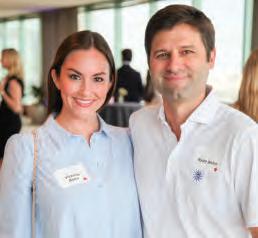

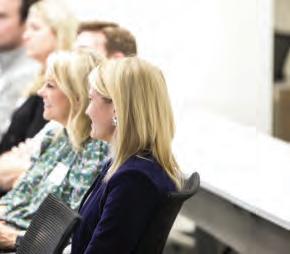





The Cary Council began 2023 with an inspiring event dedicated to innovative cancer care. Council members welcomed John Sweetenham, M.D., to discuss how UT Southwestern is advancing patient-centered care for patients battling cancer.


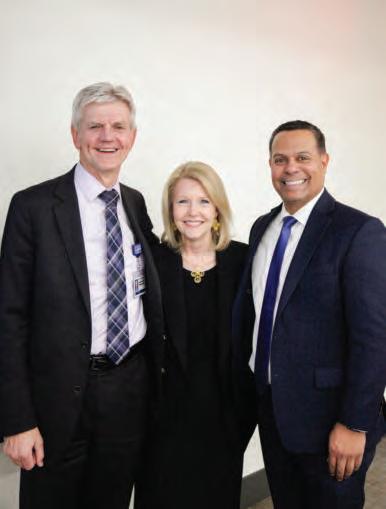
The event was held at the Cancer Care Outpatient Building on UT Southwestern’s campus. Attendees enjoyed an evening of in-depth discussion about innovative care and welcomed Josie Sewell as the new Chair of The Cary Council.


The Cary Council hosted a Learning From Leaders program in June of 2023 that featured Southwestern Medical Foundation President and CEO Michael T. McMahan and Foundation Chair Jere W. Thompson, Jr. The two leaders welcomed members of The Cary Council for coffee and discussion.
The program, held in the Foundation’s Cary Boardroom, allowed attendees a chance to learn more from Jere and Michael about their vision for the future of our region and the ways The Cary Council can make a significant impact.



The 2023 honorees were selected by The Cary Council’s Steering Committee from faculty nominated by UT Southwestern leaders. “These grants build credibility for brilliant early-career researchers and to-date have enabled past recipients to secure follow-on funding, which is crucial for next steps in the meaningful research they are pursuing,” said Josie Sewell, Chair of The Cary Council.


Christina Herrera, M.D.
Assistant Professor of Obstetrics and Gynecology
Dr. Herrera has dedicated her academic career to clinical and translational research, using ultrasound and magnetic resonance imaging along with genomic techniques to study the normal and abnormal development, structure, and function of the human placenta.


Margaret “Katie” Hoge, M.D.
Assistant Professor of Pediatrics
Dr. Hoge developed a novel approach to study how parental mental health influences the neurodevelopmental outcomes of newborns, a relationship that can lead to a state known as the vulnerable child syndrome (VCS). VCS results in unhealthy parenting styles that can impair a child’s neurodevelopmental outcomes.

Avanthi Tayi Shah, M.D.
Assistant Professor of Pediatrics
Dr. Shah is a leader in translational genomics. She aims to improve diagnosis of pediatric thyroid cancer in an effort to spare patients with benign nodules from invasive and expensive surgical procedures, as well as lifelong hormone treatments.







Hosted at the T. Boone Pickens Biomedical Building on the UT Southwestern campus, this event allowed members to participate in an intimate Q&A with The Cary Council’s 2023 DocStars. Attendees enjoyed an inside look at the impact of the innovative work of this year’s Early-Stage Research Grant recipients.


Every year, this extraordinary event brings together some of the brightest minds in the field of medical research and the most generous members of our community. The 2023 event was no exception. The unforgettable night of learning and celebration, hosted by The Cary Council and presented by the Michael and Abby Gregory Foundation, featured a captivating blend of interactive simulations, delectable cuisine, and the company of esteemed early-career and established researchers from UT Southwestern.
The interactive simulations allowed guests to engage in hands-on experiences that showcased leading-edge medical research and technology utilized at the Medical Center, including testing their skills in laparoscopic surgery and participating in brain wave experiments. These stations not only provide an immersive learning experience but also serve as a testament to the innovation happening at UT Southwestern right now.
The real purpose of the night, however, was to celebrate the guests of honor: The Cary Council’s 2023 Early-Stage Research Grant recipients Christina Herrera, M.D., Katie Hoge, M.D., and Avanthi Tayi Shah, M.D. These investigators, focused on pediatrics and obstetrics and gynecology, are at the forefront of medical breakthroughs and have shown immense promise in their respective fields. Their presence at the event allowed attendees to gain insight into their work and inspired even more support for early-stage research endeavors. These three doctors represent the future of medical science and were an inspiration to all who attended.










This year’s kick-off event offered a peek at the combined vision of UT Southwestern Medical Center and Children’s Health for the future of pediatric care in North Texas. Professor and Chair of the Department of Pediatrics Jorge A. Bezerra, M.D., and Chief of the Division of Neonatal-perinatal Medicine Lina Chalak, M.D., M.S.C.S., provided members and guests of The Cary Council with a preview of the ways the new $5 billion pediatric campus will reshape how medical experts care for the area’s most vulnerable patients.


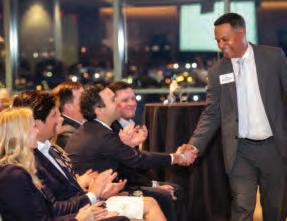






Last April, The Cary Council hosted its annual Learning From Leaders event wherein former Senator Kay Bailey Hutchison and Ambassador Robert Jordan (Ret.) discussed global issues and local responsibility. This special program was also recorded and released as the first episode of Southwestern Medical Foundation’s podcast. Senator Hutchison and Ambassador Jordan inspired the audience with personal anecdotes about mentors who shaped their storied careers, underscoring the importance of seeking wisdom from others when growing toward new levels of leadership. Both leaders also shared excellent advice for those who are moving upward in their careers, noting how pivotal the early years can be for learning what it takes to succeed.
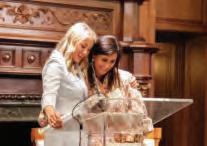

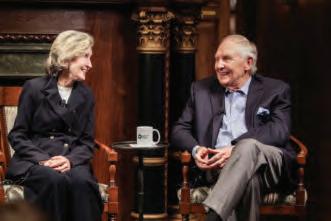


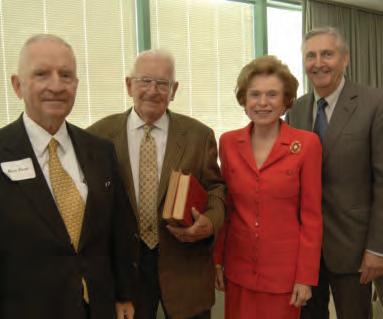









Throughout the last 40 years, the family’s contributions to Southwestern Medical Foundation and UT Southwestern have led to Nobel Prize-winning research, biomedical advancements, and health care treatments that have improved the world at large.

UT Southwestern has developed an enviable national reputation for teaching, scientific inquiry, patient care, and the importance of the Perot family, starting with Ross and Margot, is especially noteworthy when it comes to the development of this institution. The story of the family’s generosity includes medical advances that were only possible because of multi-generational curiosity, intellect, compassion, and determination.
The Perots have long been well-known for their business acumen, activism, and philanthropy, and they have impacted the lives of countless people in our community and beyond. The investments Ross, Margot; their children, Ross Jr., Suzanne, Nancy, Carolyn, Katherine; and their grandchildren have made in UT Southwestern have had a transformative influence on students, physicians, researchers, and most importantly, patients, for more than four decades.
Southwestern Medical Foundation and UT Southwestern have benefited immeasurably from the family’s service as supporters, advocates, and close collaborators. From the start, Ross and Margot made the choice to invest in people who deliver knowledge, and those investments reaped dividends that have included new drugs to treat prostate disease, blood pressure, and cholesterol. With regard to the latter, when Michael S. Brown, M.D., and Joseph Goldstein, M.D., won the Nobel Prize in 1985 for discovering the LDL receptor and its role in cholesterol metabolism, the Perots were quick to laud the first Texas-based, “home-grown” Nobel laureates. Their impassioned advocacy for the work prompted the beginning of Dallas’ ongoing commitment to support biomedical education and research.
After funding the work of Brown and Goldstein, the Perots volunteered to contribute to the efforts of their young associates. These 18 UT Southwestern scientists became known as “Perot protégés,” and their record is nothing short of remarkable. Eight of the 18 were elected into the U.S. National Academy of Sciences, an honor received by fewer than one in 1,000 biomedical scientists. Two others—Thomas Südohof, M.D., and Alfred Gilman, M.D., Ph.D.—have also been honored with Nobel Prizes.
The Perot family’s activism and advocacy also extended to veterans in a very meaningful way. In 1994, three years after the Persian Gulf War, the couple approached UT Southwestern for advice. Military service members who had been deployed in top condition were returning in poor health, even when they weren’t involved in direct combat. Insiders told the Perots that the government planned to call the condition “psychological reaction to deployment stress” and then do little else about it. The Perots found that unacceptable. They asked UT Southwestern scientists to conduct an independent study of the condition—The Perot Foundation would support the endeavor financially and run political interference.



The Perots’ efforts also garnered the support of then-Senator Kay Bailey Hutchison, who played a critical role in securing federal funding for further research on Gulf War Illness, amplifying the impact of UT Southwestern’s work on behalf of veterans.
Because the Perots and UT Southwestern took an early stand in support of America’s Gulf War veterans, an estimated 200,000 people with Gulf War Illness benefited from their research. The work continues. Epidemiologist Robert Haley, M.D., and his colleagues are currently completing advanced genomics studies they hope will result in a diagnostic test and treatments for Gulf War Illness. They are confident that someday a cure will be discovered, thanks to the compassionate leadership of this family.

is
for Dallas and North Texas. It is a nationally ranked Medical School, with an impressive number of Nobel Prize winners. As we continue to attract top talent, continued investment in cutting-edge technology and treatments through organizations such as Southwestern Medical Foundation will ensure that our citizens—and the citizens of the world— benefit from the incredible advancements happening here for years to come.

Biotechnology is arguably the most promising economic development opportunity for North Texas in the decades ahead. By supporting UT Southwestern, we not only provide for broader patient care and training future doctors but also underwrite world class medical research, which is the key to developing Dallas as a biotech hub.
T.
In the late 1980s, Ross and Margot made a substantial initial investment in UT Southwestern’s unique M.D./Ph.D. program. The family did not stop there. In 2022, The Perot family, The Perot Foundation, and The Sarah and Ross Perot, Jr. Foundation provided a transformative $50 million endowment for UT Southwestern’s Medical Scientist Training Program (MSTP), among the nation’s elite programs that provide graduates a dual M.D./Ph.D. degree to strengthen the advancement of laboratory discoveries into the clinical arena.
Funding will provide a permanent endowment for the Perot Family Scholars Medical Scientist Training Program, one of just 54 M.D./Ph.D. training programs in the country supported by the National Institutes of Health (NIH). The 44-yearold program graduates top-level physician-scientists from UT Southwestern Medical School and UT Southwestern Graduate School of Biomedical Sciences, both among the top-ranked schools nationally.
The Perot family’s support expands the number of students admitted to the dualdegree program, as well as research disciplines of study that include biomedical engineering, computational biology, bioinformatics, and data science. The investment also enhances the curriculum and experiences of MSTP students and increases efforts to recruit students from elite U.S. colleges, including top international students who wish to stay in the U.S. for their careers.
The Perot Family Scholars program builds on a legacy that Ross and Margot began investing in four decades ago, in 1987, with the $20 million gift supporting Nobel Laureates Michael S. Brown, M.D., and Joseph Goldstein, M.D., continued with their support of the Medical Scientist Training Program, and furthered in 1996 with more than $23 million of additional support for training and biomedical research. The Perot family has also generously supported the Perot Foundation Neuroscience Translational Research Center and mental health programs.


Although Ross Sr. passed away in 2019, the Perots’ decades-long philanthropic investments live on. They have played a significant role in launching UT Southwestern into a world-renowned epicenter of biomedical advancement and excellent patient care. Carolyn Perot Rathjen has been a dedicated member of Southwestern Medical Foundation’s Board since 2004, serving as a Trustee and currently as an Honorary Trustee. During her tenure, she contributed significantly as a member of the Awards Committee, including a term as Chair of the Committee. Ross Mulford, son of Nancy Perot, and his wife, Tori, are active members of The Cary Council. The family’s committed support continues to result in bold, transformative action that has forever enhanced our world.
2024
Sarah and Ross Perot, Jr. honored with The Sprague Award 2022
The Perot Family, The Perot Foundation, and The Sarah and Ross Perot, Jr. Foundation make a transformative endowed gift for UT Southwestern’s Medical Scientist Training Program
2020-2022
Gifts to support COVID-19 Response Fund and COVID-19 Frontline Workers
2019-PRESENT
Gifts to support The Cary Council Fund 2019
Major gift to expand activities in UT Southwestern’s Neuroscience Translational Research Center 2009
Gift to Kern Wildenthal, M.D., Ph.D. Fund 2005-2008
Support for UT Southwestern’s regenerative medicine research program 2000
Establishment of the U.S. Armed Forces Veterans Distinguished Chair for Medical Research in honor of Robert Haley, M.D. 1996-2004
Major gift to expand UT Southwestern’s Medical Scientist Training Program, M.D./Ph.D. dual degree program
Research investment for Robert Haley, M.D. to investigate Gulf War Illness 1997
Margot and Ross Perot Sr. honored with The Sprague Award 1990
Lead gift to Zale Lipshy capital campaign
1987-1995
Gift to enhance biomedical research in laboratories for Nobel laureates and their colleagues and strengthen training for medical sciences
1985-1989
Funding for diabetes research July 23,1981
First gift to UT Southwestern to the Mary Nell and Ralph Rogers Professorship in Immunology

The progress UT Southwestern has led in public health has yielded tremendous returns on the dollars invested. We owe a huge debt, for example, to those who supported the Medical Center’s work in cholesterol, heart disease, exercise, nutrition, and metabolism. These investments have significantly advanced the treatment and prevention of heart and metabolic disease both in our region and around the world. Continuing to invest to build programs that broadly improve the health of people in our region will enhance our collective strength and soul, while reaping the added benefit of improving productivity and prosperity.
Kathleen M. Gibson

GENEROUS HEARTS HAVE BUILT A WONDERFUL TRADITION OF PHILANTHROPY IN NORTH TEXAS, WHICH STRENGTHENS COMMUNITIES SO FAMILIES CAN THRIVE. For more than three decades, Southwestern Medical Foundation has honored the outstanding leadership of those who ignite hope for a better future through its highest community distinction—The Sprague Award. These exceptional philanthropists continue to shape the future of our region and inspire a higher standard in medical education, discovery, innovation, and care through contributions of time, leadership, and treasure. Please help us celebrate the 2023 awardees: Bonnie Bass Smith, Barbara Bass Moroney, James (Jim) E. Bass, and the Rita Crocker Clements Foundation. As children of the late Richard D. Bass and Rita Crocker Clements, these siblings are passionate about preserving their family’s legacy, which spans multiple generations and has transformed the landscape of UT Southwestern Medical Center.


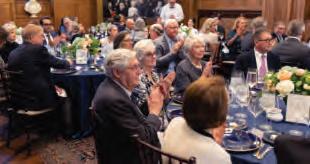





IN 1991, THE FOUNDATION CREATED A COMMUNITY SERVICE AWARD HONORING CHARLES CAMERON SPRAGUE, M.D., IN RECOGNITION OF HIS SIGNIFICANT AND LASTING INFLUENCE AT UT SOUTHWESTERN MEDICAL CENTER AND SOUTHWESTERN MEDICAL FOUNDATION.
Recipients of The Sprague Award have included: Ruth Collins Altshuler, James W. Aston, Paul M. Bass Jr., Julie T. and Louis A. Beecherl Jr., H.R. (Bum) Bright, Nancy Brinker, Rita C. and William P. Clements Jr., Mary McDermott Cook, Joe M. Dealey, Maureen and Robert Decherd, Robert H. Dedman Family (Nancy Dedman, Patricia Dedman Nail, and Rachael and Robert H. Dedman Jr.), Jerry Farrington, Earl A. Forsythe, F.B. Pete Goldman, Cecil H. Green, Ute Schwartz Haberecht and Dr. Rolf R. Haberecht, Nancy and Jeremy Halbreich, Nancy B. Hamon, Linda W. Hart and Milledge A. Hart III, Jess T. Hay, Lyda Hill, Hoblitzelle Foundation, Adelyn and Edmund Hoffman, Sydney and J.L. Huffines, Vester T. Hughes, Nancy and Ray Hunt, J. Erik Jonsson, Robert W. Korba, George L. MacGregor, Margaret M. McDermott, Sammye and Mike A. Myers, Edith and Peter O’Donnell Jr., Margot and Ross Perot, Madeleine and T. Boone Pickens, Caren and C. Vincent Prothro, Charlene and Lee Raymond, Laura and Jack Roach, Ralph B. Rogers, Sarah M. and Charles E. Seay, Annette and Harold C. Simmons, Jean and Dr. Bob Smith, Gay F. and William T. Solomon, Charles Cameron Sprague, M.D., The Thompson Family, Jean and Tom Walter, and Donald Zale.

UT Southwestern has become a leader in research, offering the most advanced practices and protocols in medical care. Persistent investment in research will ensure that individuals and corporations will continue to choose North Texas as their home because they will be confident that they have chosen to surround themselves and their loved ones with the best and the brightest in medical care. Thanks to UT Southwestern North Texas has quickly become a preference by patients across the country for diagnosis and treatment.
Connie O’Neill
Trustee, Southwestern Medical Foundation

BONNIE SMITH, BARBARA MORONEY, AND JIM BASS HAVE TRAVELED LIFE’S JOURNEY TOGETHER, CLIMBING MOUNTAINS THROUGHOUT THE WORLD AND SWIMMING IN ITS OCEANS. THEIR ADVENTURES TAUGHT THEM TO APPRECIATE THE LOVE OF FAMILY AND HELPED THEM BUILD A SENSE OF COMMUNITY WITH THEIR FELLOW MAN.
The siblings are grateful for the life lessons taught by their parents, who instilled a keen sense of responsibility in their children to care for others and the world. Their mother, Rita Crocker Clements, was a civic and philanthropic leader who was married for 36 years to former Texas Governor William P. Clements Jr. Rita and Governor Clements are remembered for their extensive contributions through government and community service to the city of Dallas and the state of Texas. The siblings’ father, Richard D. Bass, was a businessman, rancher, ski area developer, and mountaineer who introduced his children to adventure in the great outdoors and exemplified making the most of each day.
The family’s remarkable philanthropic legacy of giving to Southwestern Medical Foundation in support of UT Southwestern Medical Center now spans three generations. The Clementses both served on the Foundation’s Board of Trustees and made a $100 million gift in 2009, the largest in the Foundation’s history. They also established the Bill and Rita Clements Advanced Medical Imaging Building and the Rita C. and William P. Clements Jr. Scholar in Medical Research. Mr. Richard Bass made various gifts to support research in depression, pulmonary fibrosis, and Alzheimer’s disease. He died in 2015 at 85 from pulmonary fibrosis.
In 2018, Mrs. Clements died at 86, and it was her struggle with Alzheimer’s disease that brought her children closer to UT Southwestern. They watched firsthand the outstanding treatment and care she received during her illness, and they made personal and collective gifts through the Rita Crocker Clements Foundation to the Peter O’Donnell Jr. Brain Institute, creating the Rita Clements Center for Clinical Research
in Alzheimer’s and Neurodegenerative Diseases and the Rita Clements Chair in Brain Research to support depression/ bipolar and Alzheimer’s translational research.
The family also provides volunteer leadership to support Southwestern Medical Foundation and UT Southwestern. Mr. Jim Bass has served on the Foundation’s Board of Trustees, where Mrs. Smith presently serves and is a member of the Investment Committee and Chair of the Personnel and Retirement Plan Committee. She has also served on the Campaign for the Brain Steering Committee and the President’s Advisory Board. Mrs. Smith’s son, Mason Smith, is a member of The Cary Council. Mrs. Smith’s daughter, Caroline Smith, is an Instructor in the Department of Pediatrics in the Division of Hematology and Oncology at UT Southwestern / Children’s Medical Center Dallas. Dr. Smith completed her medical degree at UT Southwestern in 2017 and her residency training in Pediatrics at Boston Children’s Hospital and Boston Medical Center in the Boston Combined Residency Program (BCRP). Mr. Bass’ son, Kevin Bass, worked at UT Southwestern in Dr. Helen Hobbs’ lab in molecular genetics for two years after receiving his master’s degree.
Each generation strengthens the family legacy, and giving together remains a bonding experience for the Bass siblings and their 13 adult children. Proud of their family’s legacy of hope, they continue their important work to make Dallas a great place to live for present and future generations.
DR. HONG Z. BASS AND MR. JAMES E. BASS
Rita Clements Chair in Brain Research
Dennis K. Stone, M.D. Memorial Fund
Friends/Affinity Groups
Programs in medical education, research, or clinical care
Pulmonary disease research
BARBARA AND JAMES M. MORONEY III
Rita Clements Chair in Brain Research
Programs in medical education, research, or clinical care
Friends/Affinity Groups
Pulmonary disease research
BONNIE AND PETER P. SMITH
Rita Clements Chair in Brain Research
Dennis K. Stone, M.D. Memorial Fund
Programs in medical education, research, or clinical care
Friends/Affinity Groups
RITA CROCKER CLEMENTS FOUNDATION
Rita Clements Center for Clinical Research in Alzheimer’s and Neurodegenerative Diseases
RICHARD D. BASS FOUNDATION
Center for Depression Research and Clinical Care
Pulmonary fibrosis research
Harriet L. Worsham Fund for Alzheimer’s disease research
GOVERNOR BILL AND RITA CLEMENTS
Made a transformative $100 million gift through Southwestern Medical Foundation, the largest single donation in the Foundation’s or UT Southwestern’s history to support the institution’s research, education, and clinical mission
Bill and Rita Clements Advanced Medical Imaging Building
Rita C. and William P. Clements Jr. Endowment for Scholars in Medical Research
JAMES E. BASS
Trustee, Southwestern Medical Foundation
Member, Southwestern Medical Foundation Grants Committee
BONNIE BASS SMITH
Trustee, Southwestern Medical Foundation
Member, Southwestern Medical Foundation Executive Committee
Member, Southwestern Medical Foundation Investment Committee
Member and Chair, Southwestern Medical Foundation Personnel and Retirement Plan Committee
Member, UT Southwestern Campaign for the Brain Steering Committe
Member, President’s Advisory Board, UT Southwestern
MASON SMITH
Member, The Cary Council

How did your mother’s involvement in Dallas and across Texas influence you as you got older and started to realize her impact on the world?
Mrs. Moroney: “My earliest memories of being with Mom in terms of her work in the community was when she piled all four of us into her station wagon to canvass door-todoor in different neighborhoods to get out the vote. Mom engaged in the community, and we saw how hard she worked and the different responsibilities she took on that made an impact. One of the greatest gifts we received was our education. Our parents were invested in the schools we attended, both with time and treasure. They taught us to lead by example and continue giving back to the entities that enrich our lives.”
Describe the adventures you shared with your father and how that sense of adventure has influenced how you live your own life.
Mr. Bass: “Our father’s adventure in life was an incredible experience. He was the first human to climb the ‘Seven Summits,’ the tallest mountain on each continent. He celebrated God’s grandeur through nature and lived life to the fullest. We were part of those adventures, and it drew us together. He taught us to go beyond what we think we can do and expose ourselves to the beauty of the world and all its challenges.”
What makes it special to be honored with the Sprague Award?
Mrs. Smith: “I am very humbled to receive The Sprague Award, particularly thinking about the stature and the beneficence of all the prior awardees. I love the fact that a lifelong friendship began when Charlie Sprague and Bill Clements were chemistry lab partners at Southern Methodist University. These two men have done so much for UT Southwestern, Dallas, and our state, which makes the award even more special because of that personal connection.”
Mrs. Moroney: “What is most meaningful to me is that The Sprague Award is an extension of what my mom taught us and the example she set for us. It is like a beautiful circle of life. It is extremely special for me to receive this award with my siblings. I am grateful for the collaboration that we share to give to the world outside of ourselves, which is important to each of us.”

Mr. Bass: “My mother would be proud and happy that my two sisters and I are being honored together for the same award that she received. It shows how her children learned to give to their community and help others from her strong example of caring. We share great admiration, respect, gratitude, love, and devotion to her. And that reciprocal sharing of emotion for each other would touch her deeply.”
Please describe UT Southwestern’s relationship with the North Texas community.
Mrs. Smith: “Texans are proud, and it is built into our DNA to excel and become the absolute best we can be. It was a combination of both doctors and community business leaders that started Southwestern Medical Foundation in 1939, which then created the Medical School. Subsequent generations have continued to assist both philanthropically and through business support to build UT Southwestern into the world-renowned institution it is today. Most recently, UT Southwestern has expanded efforts to highlight its mission to serve all communities in the North Texas region, including the underserved, through Redbird and the new Peter O’Donnell Jr. School of Public Health.”
What motivates your commitment to enhance your community for future generations?
Mrs. Smith: “I am fascinated with all the medical breakthroughs that are happening today with advancements in science and imaging, data collection, and clinical care. I believe UT Southwestern is one of the preeminent institutions worldwide in these activities.”
Mrs. Moroney: “As the next generation, it is our turn to step up and to make a difference in similar ways in which our parents made a difference. It is gratifying for me to have the ability to now take it into our own hands and continue the legacy they began decades ago to benefit future generations.”
Mr. Bass: “We need to be a society that cultivates and inculcates curiosity every day in people about trying to understand the fundamental problems in our world. The beauty of medical science is that researchers wake up every day with a mind of curiosity, not one of judgmentalism. And I think to the extent that we can have curiosity flourish in our culture, we would benefit greatly.

You have made a major gift to advance brain science and care. What excites you about the future of the Peter O’Donnell Jr. Brain Institute?
Mr. Bass: “Peter O’Donnell lived life big, and he was not going to let anything stand in his way of setting a goal that was an indomitable hill to climb. Advancing brain science is also an indomitable hill to climb. UT Southwestern has started the climb with passion, endurance, and confidence to get down to the root causes of brain diseases and discover new ways to develop better therapeutics and cures.”
Mrs. Moroney: “We have witnessed how brain diseases devastate lives. Both my mother and my mother-in-law had Alzheimer’s disease. I look forward to the day when scientists will have a better understanding of the disease and can provide treatments to help slow or stop its progression. Even beyond that, mental illness and other brain diseases affect people of all ages and their families. Ours is no different. I think it is very important that researchers at the O’Donnell Brain Institute are not only addressing these issues, but they are also making it easier for people to talk about them.”
What do you hope the future holds for your family’s legacy?
Mrs. Smith: “I hope our family legacy becomes embedded in the productive lives of our children and their children and that they continue our mother’s example of fostering excellence in education, medical care, and community service. We hope we have led by example, and that they will understand that a life becomes enriched by giving outside of yourself to the greater community in all fields, and particularly to those in need.”
Mrs. Moroney: “Philanthropy has been a big part of each generation of our family. We enjoyed working together and making decisions about giving with our parents, and we wanted to get our children involved. Each December, we ask them to give a gift from the family foundation to their favorite cause. They not only enjoy choosing a cause that is important to them, but they enjoy learning about where their cousins are giving and where their passions lie. We hope as their families expand, they will continue to make philanthropic giving to their community an important part of their lives.”
Leading the Conversation on Health
is a forum series hosted by Southwestern Medical Foundation at Old Parkland that highlights the work of health care leaders in our community. The 2023 program, moderated by UT Southwestern Medical Center’s Executive Vice President for Institutional Advancement Marc A. Nivet, Ed.D., M.B.A, featured a panel of three UT Southwestern researchers addressing how biomedical engineering is currently impacting medical treatment and disease prevention. Associate Professor of Biomedical Engineering Kareem Azab, Ph.D., discussed new nanotherapy advances that identify and treat cancer cells directly while sparing healthy tissue. Assistant Professor of Radiology Elizabeth Moody Davenport, Ph.D., talked about magnetoencephalography (MEG scan), a completely safe and noninvasive screening that detects the signature Alzheimer’s proteins on the brain much earlier than PET scans. Internal Medicine Professor James de Lemos, M.D., spoke of the impact technology is having on cardiology, including personal devices that detect rhythm abnormalities and report them to health providers via Bluetooth for quick intervention, and new tests that can detect the heart attack marker troponin in levels that are a thousandfold lower than 10 to 15 years ago.
To learn more, scan below and watch the full Leading the Conversation on Health video.


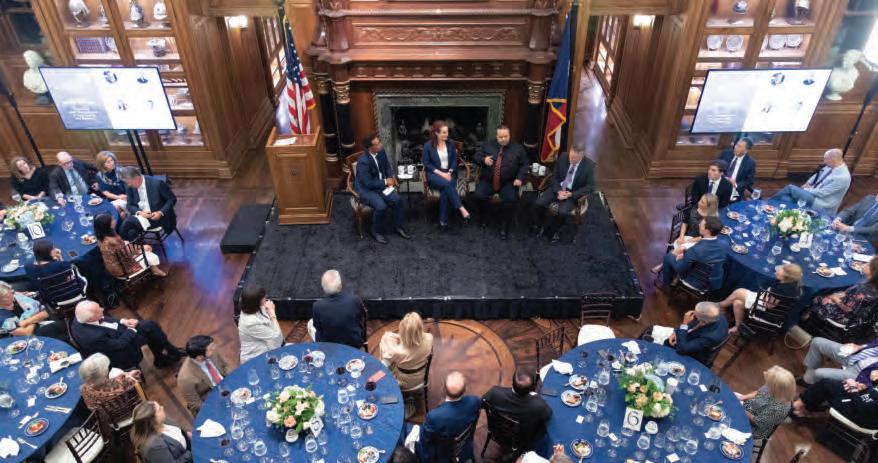
“IT’S NOT SCIENCE FICTION. IT’S UT SOUTHWESTERN.”
— Marc A. Nivet, Ed.D., M.B.A




During the first meeting of the Board of Trustees of Southwestern Medical College in 1943, Southwestern Medical Foundation instituted the Ho Din Award to recognize those who exemplify the unique personal qualities embodied by the best physicians: medical wisdom combined with human understanding.

Southwestern Medical Foundation named Whitney Stuard Sambhariya, M.D., Ph.D., the 2023 Ho Din Award Winner for her excellence in academics, service, and scholarship. As a North Texas native, she has dedicated herself to the furtherance of others within the Dallas-Fort Worth area by co-founding a student interest group focused on disabilities as well as the 501c3 nonprofit organization, Cradled with Love, which has provided more than 1,000 mothers with baby wraps to allow for kangaroo “skin-to-skin” care. She also cofounded and managed Brother Bill’s Helping Hands StudentRun Free Clinic and has served on the Board of Directors of the Society for Student-Run Free Clinics.
Dr. Sambhariya, who is currently completing her residency in ophthalmology at Johns Hopkins Hospital, took her interest in service and community education even further through a Schweitzer Fellowship during which she created a STEM Empowerment and Education Course for 250 students. She also authored and received a TMA Foundation Grant for a STEM project that impacted more than 4,000 students and helped author more than 30 policies to improve patient care through her volunteer advocacy.






The Award continues to be the highest honor bestowed on a UT Southwestern medical student or medical leader.









This year, the Ho Din Award went to Alexa Wilden, M.D., who was inspired to start her journey in medicine at a very young age. In fact, she was just seven years old when her mother developed a rare, incurable neurological condition that took away her ability to walk. Wilden quickly found that not all physicians were the same when it came to providing care. The professionals who supported and encouraged the family throughout their considerable challenges were the ones who stood out as true healers.
Dr. Wilden’s childhood experiences led to her mission to serve others. When she arrived at UT Southwestern, she quickly became involved in numerous student interest groups and research. She also tutored courses through UT Southwestern’s Student Academic Support Services team. She found working in free clinics supported by UT Southwestern among the most rewarding experiences of medical school. Especially satisfying were opportunities to support vulnerable populations and witness junior medical students experience their first “real doctor moments.” Although she initially planned to specialize in oncology, Dr. Wilden soon discovered general internal medicine was her calling. “With general internal medicine, you get to treat almost everybody,” she says. “It’s just the place I can become the doctor I want to be.”
For almost half a century, Betty Morgan and Tricia Beall, the daughters of Richard Mays Smith, M.D., have kept their father’s commitment to “the art of medicine”alive. Dr. Smith was a beloved and revered internal medicine practitioner who took great joy in his role as an educator in academic medicine. His family created the Richard Mays Smith Award in Internal Medicine in 1975, which is awarded annually by Southwestern Medical Foundation to one or more graduating medical students at UT Southwestern Medical Center who excel during clinical rotations.
• 2023 RECIPIENTS • LUCY CAI, M.D., ISHWAR CHUCKAREE, M.D., JORDAN FRANKLIN, M.D., MICHAEL TRINH, M.D., PH.D.
• 2024 RECIPIENTS (TOP PHOTO) • AVERY HAGER, M.D., CHRISTOPHER JOSHI, M.D., MICHAEL LI, M.D., MAISHARA MUQUITH, M.D., NICHOLAS SEVEY, M.D.,
ALSO PICTURED: ALEXA WILDEN, M.D., RECIPIENT OF THE 2024 HEMPHILL-GOJER AWARD IN INTERNAL MEDICINE
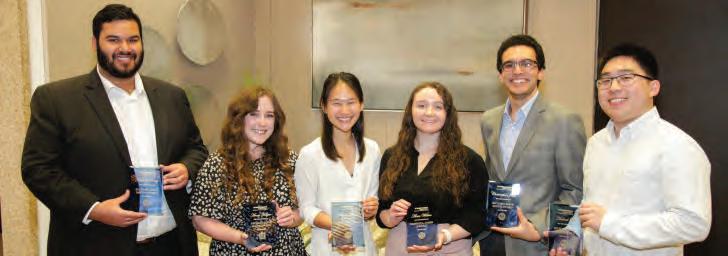

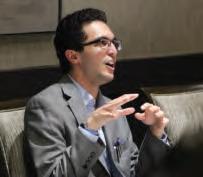





The Priddy family’s support for medical progress has spanned generations. The late Kathryn Amsler Priddy and husband Ashley Horne Priddy made gifts to Southwestern Medical Foundation through the Kathryn and Ashley H. Priddy Fund for medical student scholarships and supported UT Southwestern Medical Center through the Dr. Eugene P. Frenkel Cancer Research Fund.
A gift in the 1990s from Mrs. Priddy’s mother Amanda Amsler and an endowment fund that honored Mr. Priddy were combined to establish the Kathryn and Ashley H. Priddy Fund at Southwestern Medical Foundation. The Fund benefits medical education scholarships at UT Southwestern and also inspires the next generation of physicians through the Priddy Award, which funds a summer research fellowship for outstanding high school students who participate in the Dallas Regional Science and Engineering Fair. This fellowship is part of STARS (Science Teacher Access to Resources at Southwestern), which serves more than 20,000 teachers and 50,000 students in North Texas and beyond.
• 2023 RECIPIENTS •



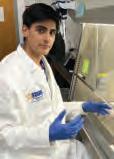



Made possible by a bequest from the late Ida M. Green, Southwestern Medical Foundation is proud to support the Women in Science and Medicine Advisory Committee (WISMAC) in the annual presentation of the Ida M. Green Award. This award acknowledges a female graduate student in the UT Southwestern Graduate School of Biomedical Sciences who has demonstrated an outstanding commitment to research excellence, the well-being of fellow students, and exceptional community service.

Gina J. Park is a student in the Cell and Molecular Biology Graduate Program and an M.D./Ph.D. candidate in the University’s Perot Family Scholars Medical Scientist Training Program. As part of her dissertation research in the lab of HHMI Investigator Vincent Tagliabracci, Ph.D., Associate Professor of Molecular Biology, Ms. Park discovered the mechanism of mRNA capping by SARS-CoV-2, which involves a novel reaction catalyzed by a pseudokinase domain. This work, reported in Nature, has also been recognized by the UT Southwestern 2022 Kirkpatrick Award and by an award for best poster at the 2022 FASEB Protein Kinases and Phosphorylation Conference.
Ms. Park’s contributions in support of fellow UT Southwestern graduate students include serving as a student representative for WISMAC, participating in outreach activities for the STARS symposium, playing an active role in the Women in MSTP Committee, and working with the Alliance for Women Scientists as a panelist for Careers in Science and Medicine discussions at the Irma Lerma Rangel Young Women’s Leadership School in Dallas and the Young Women’s Leadership Academy in Fort Worth, both all-girls public schools.
• 2024 RECIPIENT • MAGGIE WANG

Maggie Wang, a graduate student in the Gao Lab, has been honored with the 2024 Ida M. Green Award for research that could advance nanoparticle-based cancer immunotherapies. Ms. Wang’s research focuses on therapies that target immune mechanisms mediated by the stimulator of interferon genes (STING) protein. STING plays an important role in innate immunity by sensing microbial or self-DNA as a danger signal, thereby triggering the mobilization of white blood cells and other body defense systems. She studies how STING works in dendritic cells—part of the immune surveillance system that identifies microorganisms or cancer cells so that the adaptive immune system can secrete kill signals to eliminate threats.
Ms. Wang was born in New York, raised in Taiwan, and moved to Seattle in her mid-teens. She earned her bachelor’s degree in chemistry and master’s degree in material science at Western Washington University. Ms. Wang began graduate school during the pandemic and looked for unique ways that students could connect. As president of the Biotechnology Club, she led her colleagues in developing programs, including an educational seminar series and industry mentorship opportunities. She also requested and received funding from Lyda Hill Philanthropies for students to learn about startup biotechnology businesses through resources at BioLabs Pegasus Park.
Maureen and Robert Decherd have led the way in building a thriving medical district in North Texas by graciously supporting various campaigns and initiatives of UT Southwestern Medical Center over the last 30 years, including the Parkland Memorial Hospital Neuro-Trauma Award Honoring Maureen and Robert Decherd, Duke Samson, M.D., Jim Thornton, M.D., and Babu Welch, M.D. Drs. Samson, Thornton, and Welch were the physicians who provided expert care for Maureen following a traumatic accident. The award is given annually to an individual deemed to have made an outstanding contribution to the care of neuro-trauma patients through the Parkland Memorial Hospital Neurosurgery Service.
2023

• 2024 RECIPIENT • ALEX VALADKA, M.D.




















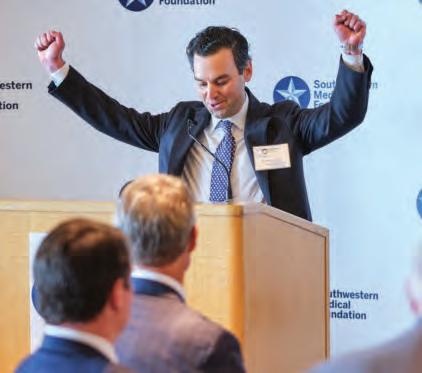





















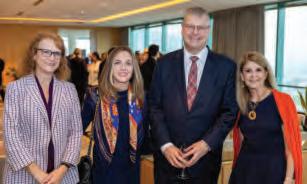






The Wildenthal Society, recently renamed in honor of esteemed members Marnie and Kern Wildenthal, M.D., Ph.D., was established in 1995 to honor those who make planned gifts to benefit Southwest Medical Foundation or UT Southwestern Medical Center. To date, more than $200 million in planned gifts have been received, with one-third coming from members of The Wildenthal Society. Their generosity has a direct impact on scientific discoveries, outstanding medical education, and excellence in patient care.







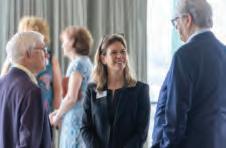



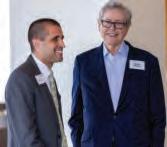

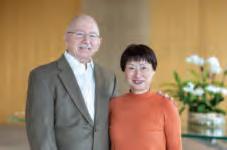
SOUTHWESTERN MEDICAL FOUNDATION’S NEW CFO ANSWERS EIGHT OF OUR MOST PRESSING QUESTIONS

PRIOR TO TAKING THIS POSITION LAST YEAR, YOU SERVED AS THE CFO AT THE TRINITY PARK CONSERVANCY. WHAT DID YOU LEARN DURING YOUR TENURE THERE THAT YOU’LL BRING TO SOUTHWESTERN MEDICAL FOUNDATION?
Ms. Fletcher: Dallas is fortunate to have a generous philanthropic community with aspirational ideals. Donors are savvy and target their interests through gifts to causes that help create a better Dallas. This was evident at the Conservancy, where they’re building a transformative park that will positively impact the city’s economy and livability. As a CFO, I’m mindful of the serious responsibility in stewarding the funds entrusted to a nonprofit to grow and sustain impact. The Foundation is one of several philanthropic endeavors supporting the fundamentals of building a better city, and great cities must have great health care.
WHAT DREW YOU TO SOUTHWESTERN MEDICAL FOUNDATION?
Ms. Fletcher: There’s a warmth that I believe stems from the endless opportunities outlined in its mission to provide sustainable funding for innovative medical research, outstanding medical education, and compassionate patient care.
I believe nonprofit leaders need to align with the organization’s mission to do exemplary work. Good health tends to be something that people take for granted, but when things go wrong, it’s important that everyone has access to best-in-class solutions. The Foundation’s mission is grounded in hope and possibilities, and it’s poised to inspire a higher standard in medicine leading to the greatest outcomes. That’s a mission I can champion.
Q:CAN YOU SHARE SOME OF THE INSIGHTS KAY SCHLANKEY HAS BEEN ABLE TO OFFER YOU DURING THE TRANSITION?
Ms. Fletcher: Kay has been tremendously supportive. Her strategic leadership during her 16-year tenure has been a driver of excellence and high standards, and I look forward to building upon the foundation she established. Kay told me this is a special place, and I know it to be true for myself. Q:
WHAT ARE SOME OF SOUTHWESTERN MEDICAL FOUNDATION’S STRENGTHS?
Ms. Fletcher: The Foundation is fortunate to have some of the brightest financial minds on its Investment Committee—they have seen it all. Their expertise prudently guides our risk-adjusted positions for our $1.2 billion in total pooled assets. The Foundation’s strong balance sheet consists of healthy cash reserves and minimal debt, demonstrating its sustainability in the continuation of our mission to create meaningful and lasting impact in advancing progress in medicine.
WHAT DO YOU HOPE TO BUILD ON OR CHANGE?
Ms. Fletcher: The Foundation was founded in 1939 as a big idea: build the best medical facilities and school in the Southwest and study the cause, prevention, and cure of diseases. It’s been delivering on that idea for 85 years. My hope is to build on these successes and position the Foundation as an anchor sustainable funding source on the frontier of innovation in medical research and patient care.
WHAT ARE SOME OF YOUR TOP PRIORITIES THIS YEAR?
Ms. Fletcher: My first year is all about learning and simplification. The Foundation is fortunate to have a talented, tenured, and committed team, and as I learn from them, I’m asking a lot of questions. I’m exploring efficiencies of process and technological support to bolster productivity for routine work. Having seamless systems in place can free people to work at their highest level and think boldly about positioning the Foundation for the next 100 years.
WHAT HAVE YOU ENJOYED MOST ABOUT YOUR JOB SO FAR?
Ms. Fletcher: My colleagues and our partners! The Foundation has cultivated a strong culture rooted in four building standards that guide our work and collaboration, both internally and externally: Service to Community, Vision of Excellence, Mindful Stewardship, and Best Outcomes. These standards are evident across our small-but-mighty team. Everyone is very mission driven and supports the Foundation with their unique talents. Our partners also understand the Foundation’s priorities and bring a lens to their work that aligns with our values.
It’s also special to be working on the Old Parkland campus in the same place where the Foundation started Southwestern Medical College in 1943. If you’re into history like I am, this is a truly unique place for learning and inspiration. There’s even a State of Texas Historical Marker memorializing the significance of this place.
Q:ON A PERSONAL NOTE, WHERE CAN WE FIND YOU ON SMU HOME GAME DAYS?
Ms. Fletcher: I was thrilled when SMU began its Boulevard tailgates! Growing up in Baton Rouge, LSU tailgating is almost a sport in its own right, so when the opportunity presented itself, my Cox MBA friends and I reserved a spot on the Boulevard in its inaugural year. We borrowed from some SEC traditions like arriving extra-early, festively decorating the spot, enjoying the big games on television while waiting for the home game, and always remembering to bring a little lagniappe—“a little something extra”—to share with friends when they stop by. Geaux Ponies!
Financial strength and dedication to transparency continue to earn Southwestern Medical Foundation a Candid (formerly GuideStar) Platinum Seal and Charity Navigator Four-Star Rating, which represent their highest ratings.
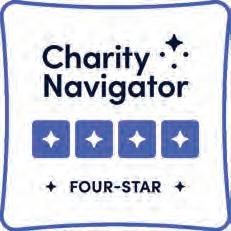
Parkland Hall at Old Parkland
3889 Maple Avenue, Suite 100 Dallas, Texas 75219 swmedical.org
At swmedical.org, you’ll find news, information, and links to follow us on social media.
CHANGE SERVICE REQUESTED
Although we try to continually update our address list, errors and duplications sometimes occur. Please email info@swmedical.org to inform us of any necessary corrections. In the meantime, we hope you will share any extra copies of Southwestern Medical Perspectives with a friend.
Dallas, Texas
Permit No. 3997
For 85 years, the work of Southwestern Medical Foundation has been driven by a community determined to meet the health care needs of a rapidly expanding region. Today, we stand on the precipice of discoveries and treatments that promise to transform medicine in North Texas and the world over. Your unwavering support is what makes the groundbreaking research and advancements possible. Together, we can ensure that we remain at the forefront of medical innovation for years to come.



